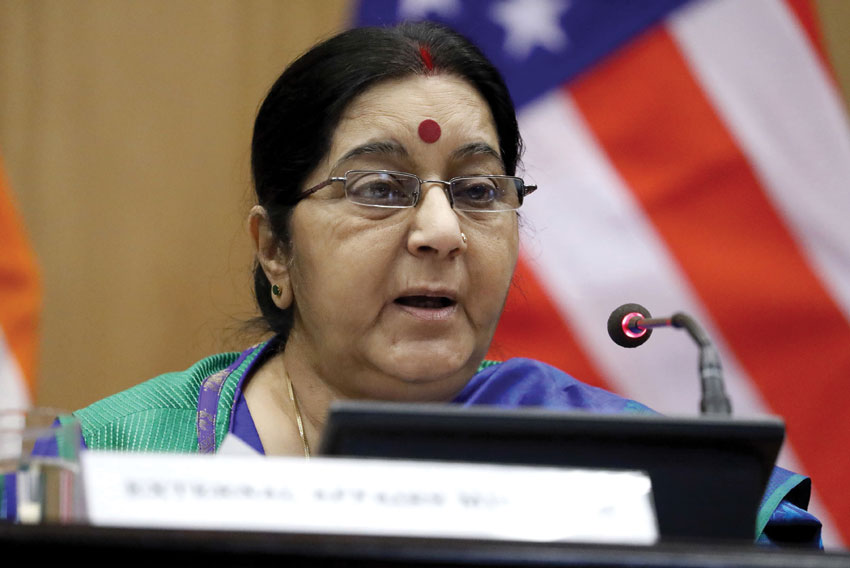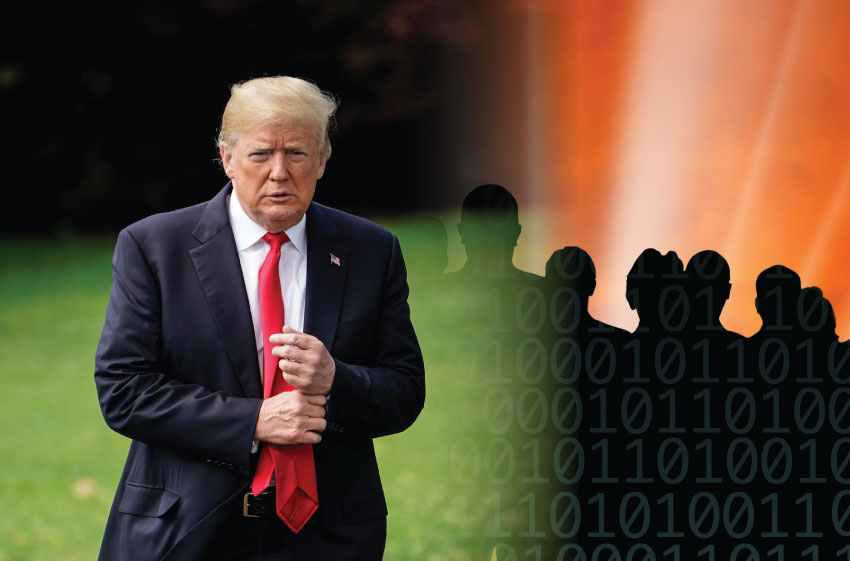Complaints of H-1B Visa Fraud
President Donald Trump speaks to the media as he makes his way to board Marine One from the South Lawn of the White House, May 23, in Washington, D.C. Trump was heading to New York to attend a roundtable discussion on immigration. (Mandel Ngan/AFP/Getty Images)
More than 5,000 complaints of H-1B visa fraud and abuse have been received by a federal agency on a dedicated e-mail helpline that was launched by the Trump administration last year, an official said, writes Lalit K. Jha. Amid the U.S. plan to scrap a rule allowing spouses of H-1B visa holders to work legally in the country, India’s External Affairs Minister Sushma Swaraj said, May 20, the government would make all efforts to persuade the Trump administration against such a move.
The H-1B visa is a non-immigrant visa that allows U.S. companies to employ foreign workers in specialty occupations that require theoretical or technical expertise. The technology companies depend on it to hire tens of thousands of employees each year from countries like India and China.
“As of May 21, 2018, the USCIS has received over 5,000 tips to the dedicated H-1B email address,” Philip Smith, a spokesperson for the U.S. Citizenship and Immigration Services (USCIS) told PTI.
After President Donald Trump signed the “Buy American, Hire American” executive order last year, the Fraud Detection and National Security Directorate (FDNS) established email addresses dedicated to receiving information about suspected H-1B and H-2B fraud or abuse.
The FDNS leads USCIS’s efforts to combat immigration benefit fraud.
Anyone (including both American workers and workers who suspect they or others may be the victim of H-1B or H-2B fraud or abuse) can email ReportH1BAbuse@uscis.dhs.gov or ReportH2BAbuse@uscis.dhs.gov to submit tips, alleged violations, and other relevant information about potential fraud or abuse, Smith said.
The USCIS, however, did not provide any other details on the nature of the complaints, the companies involved, and which country’s high-tech professionals were the victims of H-1B visa fraud and abuse.
“Pursuant to the Buy American, Hire American executive order, FDNS has helped the agency investigate the H-1B program to protect American workers,” Smith said.
In April 2017, USCIS FDNS created and implemented the Targeted Site Visit and Verification Program (TSVVP) as part of its continuous efforts to enhance the integrity of the immigration benefit process, he said.
“This targeted approach focuses on H-1B dependent employers (those who have a high ratio of H-1B workers as compared to U.S. workers, as defined by statute); Cases that we cannot validate the employer’s basic business information through commercially available data; and employers petitioning for H-1B workers who work off-site at another company or organization’s location,” he said in response to a question.
The FDNS officers resolve background check information and other concerns that surface during the processing of immigration benefit applications and petitions.
Resolution often requires communication with law enforcement or intelligence agencies to make sure that the information is relevant to the applicant or petitioner at hand and, if so, whether the information would have an impact on eligibility for the benefit.
FDNS officers also perform checks of USCIS databases and public information, as well as other administrative inquiries, to verify information provided on, and in support of, applications and petitions.
Smith said administrative inquiries may include targeted site visits inquiries conducted in cases where fraud is suspected.
The FDNS uses the Fraud Detection and National Security Data System (FDNS-DS) to identify fraud and track potential patterns, he said.
The USCIS has formed a partnership with Immigration and Customs Enforcement (ICE), in which FDNS pursues administrative inquiries into most application and petition fraud, while ICE conducts criminal investigations into major fraud conspiracies, he said.
According to the USCIS, the H-1B visa program should help U.S. companies recruit highly-skilled foreign nationals when there is a shortage of qualified workers in the country.
“Yet, too many American workers who are as qualified, willing, and deserving to work in these fields have been ignored or unfairly disadvantaged,” the USCIS says on its webpage.
Employers who abuse H-1B visa program may negatively affect U.S. workers, decreasing wages and opportunities as they import more workers from abroad, it said.
Highly popular among Indian technology professional, the H-1B visa is normally issued for three years and renewed for another three years.
The US Congress has a cap of 65,000 H-1B visas per year.
It also issues another 20,000 H-1B visas to those who have masters and higher education from a U.S. academic institute.

Would Spare No Effort to Persuade U.S.: Swaraj on Plans to End Work Permits for H-1B Spouses
The Trump administration is planning to end the Obama-era rule under which spouses of H1-B visa holders are given work permit or H-4 visa, a move that could affect more than 70,000 such visa holders. A significantly large number of these H-4 visa holders are high-skilled professionals from India.
Addressing her annual press conference in New Delhi, Swaraj, when asked about the U.S. plan, said it was true that President Donald Trump was reviewing the H-4 visa program and there were reports of its possible revocation.
“This is not just for H-4, I am also talking of H1-B visa as well. We are making a three-pronged effort to save these visas. We are talking to the White House, we are talking to state administration, and we are also talking to Congressmen and Senators,” Swaraj said.
This has yielded results as 130 members of Parliament, both Congressmen and Senators, have written a letter to Trump asking him not to revoke H-4 visas, stating that the American economy will be jolted by it, she said.
“We are trying our best to save H1-B visas, H4 visas. But America is a sovereign country. Ultimately, they have to decide. How successful we will be, will be decided in the future. But I assure the country from this platform that we would not spare any effort,” she said.
The H-4 visa holders had obtained work permits under a special order issued by the previous Obama administration.
Indian Americans were a major beneficiary of this provision. More than 100,000 H-4 visa holders have benefited from this rule.
The 2015 rule allowed work permits for spouses who otherwise could not be employed while H-1B visa holders seek permanent resident status—a process that can take a decade or longer.


